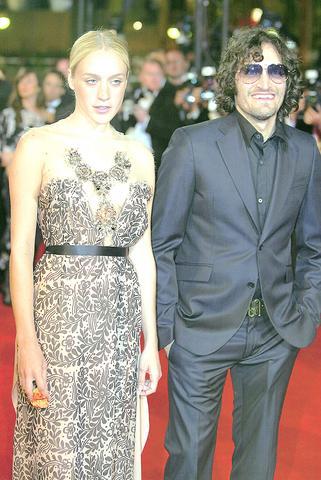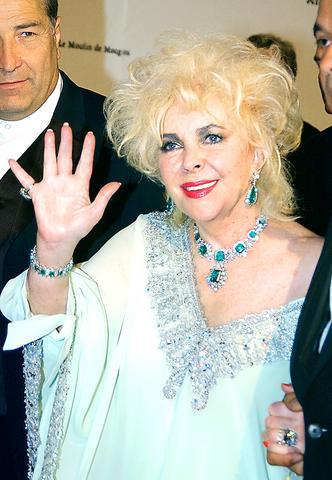Wannabe famous?
It helps in Cannes, if you make a film that is either extremely boring or extremely provocative but preferably both, as American actor and director Vincent Gallo is finding out.

PHOTO: AP
Last year, French film Irreversible made some in the audience throw up and even faint, after watching Monica Belucci being raped in the film for 10 minutes.

PHOTO: REUTERS
This year, Gallo, the former Calvin Klein jeans sex icon, put his audience to sleep for the first two thirds of the film, with one and a half hours of tedious driving scenes.
Then, the audience was suddenly jolted by a graphic oral sex scene in the last 30 minutes of the film that featured Gallo and actress Chloe Sevigny.

PHOTO: AFP
Brown Bunny immediately became the most booed movie so far at this year's Cannes Film Festival. At the following press conference, one of the first questions, inevitably, was, "Is it yours? [the penis]" and, "How did you convince Chloe to do the scene with you?"

PHOTO: AFP
"Weren't you a bit impressed?" Gallo replied.
"Not necessarily. And definitely not with the size!" some journalists responded.
Gallo first became known as an actor in Arizona Dream and French film Trouble Everyday. His directorial debut Buffalo `66 (1998), an edgy comedy in which he stars with Christina Ricci, was generally regarded as a successful American independent film.
Like Buffalo `66, Brown Bunny is another film produced, written, edited, and acted in, by Gallo. He was also in charge of cinematography and production design.
The story follows the cross-country road journey of a motorcycle racer named Bud, who spends five days driving from New Hampshire to California. Throughout the long drive he is haunted by the memory of his true love. In trying to put the past behind him, he asks any woman he meets on the road to come with him, but leaves them behind after they agree.
But the film indulges itself in Vincent's loneliness, with large portions of the movie focusing on him driving down an empty road, with no dialogue. Sometimes he pulls over for gas or else flirts briefly with strangers.
The monotony of the driving scenes drove around a thousand people in the audience at Cannes to make noises, boo, pretend to cough and laugh at inappropriate moments throughout the film. At the end of the screening, Gallo and Sevigny received a mock standing ovation from the audience. Dozens of other people walked out in the middle of the film.
"Is it a Vincent Gallo ego trip?" a journalist asked.
"It's dealing with un-popularity," Gallo said. "I have learnt to deal with the fact that I'm not popular. It comforts me. I'm not looking for popularity, I don't even want a career and even less so, a place on Hollywood's power list."
"I know you are calling it narcissistic behind my back. But I am not ... I am only interested in things I know, which are things about myself ... That's why I don't direct other people's scripts," Gallo said.
Commenting on the sex scene, Gallo said that he was not interested in
eroticism or pornography. "What people do physically in their sexual behavior contrasts with what they think they're doing, or how the impression is felt emotionally."
"When making the movie ... I couldn't imagine this scene in any other way. I couldn't separate the concept of watching what people do physically, and understanding what they're going through emotionally," Gallo said.
Sitting beside Gallo throughout the press conference, Sevigny remained calm. "I accepted the role on the phone after talking to Vincent, without thinking of or seeing the script. I know his talent and I trusted him," said the actress, who had previously refused to attend the press conference.
Gallo later revealed that he fired both Winona Ryder and Kirsten Dunst during filming.
He said he had only cast Ryder, because, "I knew she was going to jail and this would have been good for the movie ... I would never cast Winona Ryder in a significant role."
He said he fired Ryder because, "She flew in having not called her agent, which was great, but then she ball-busted me over her wardrobe and her make-up. At 9am, when we were supposed to shoot, she had a mask on and ear-plugs in. She had, let's say, taken some tablets that seemed to have an impact on her behavior ... So I fired her".

By 1971, heroin and opium use among US troops fighting in Vietnam had reached epidemic proportions, with 42 percent of American servicemen saying they’d tried opioids at least once and around 20 percent claiming some level of addiction, according to the US Department of Defense. Though heroin use by US troops has been little discussed in the context of Taiwan, these and other drugs — produced in part by rogue Chinese Nationalist Party (KMT) armies then in Thailand and Myanmar — also spread to US military bases on the island, where soldiers were often stoned or high. American military policeman

Under pressure, President William Lai (賴清德) has enacted his first cabinet reshuffle. Whether it will be enough to staunch the bleeding remains to be seen. Cabinet members in the Executive Yuan almost always end up as sacrificial lambs, especially those appointed early in a president’s term. When presidents are under pressure, the cabinet is reshuffled. This is not unique to any party or president; this is the custom. This is the case in many democracies, especially parliamentary ones. In Taiwan, constitutionally the president presides over the heads of the five branches of government, each of which is confusingly translated as “president”

An attempt to promote friendship between Japan and countries in Africa has transformed into a xenophobic row about migration after inaccurate media reports suggested the scheme would lead to a “flood of immigrants.” The controversy erupted after the Japan International Cooperation Agency, or JICA, said this month it had designated four Japanese cities as “Africa hometowns” for partner countries in Africa: Mozambique, Nigeria, Ghana and Tanzania. The program, announced at the end of an international conference on African development in Yokohama, will involve personnel exchanges and events to foster closer ties between the four regional Japanese cities — Imabari, Kisarazu, Sanjo and

Sept. 1 to Sept. 7 In 1899, Kozaburo Hirai became the first documented Japanese to wed a Taiwanese under colonial rule. The soldier was partly motivated by the government’s policy of assimilating the Taiwanese population through intermarriage. While his friends and family disapproved and even mocked him, the marriage endured. By 1930, when his story appeared in Tales of Virtuous Deeds in Taiwan, Hirai had settled in his wife’s rural Changhua hometown, farming the land and integrating into local society. Similarly, Aiko Fujii, who married into the prominent Wufeng Lin Family (霧峰林家) in 1927, quickly learned Hoklo (commonly known as Taiwanese) and